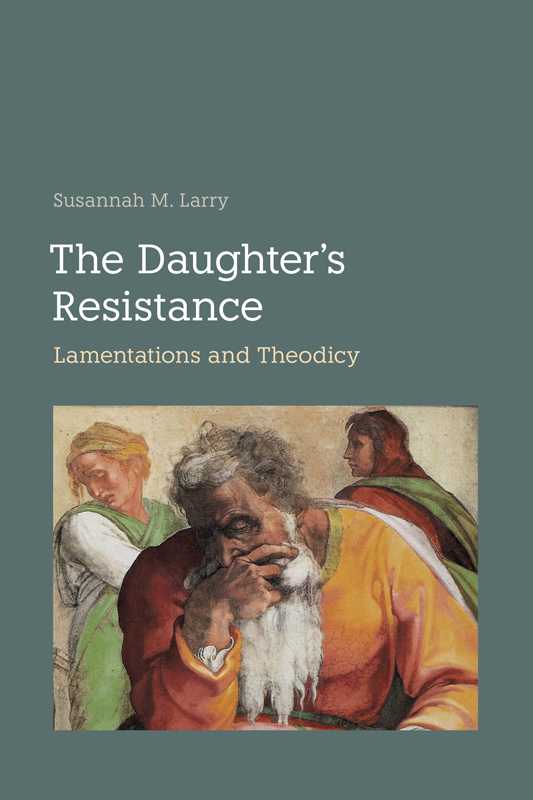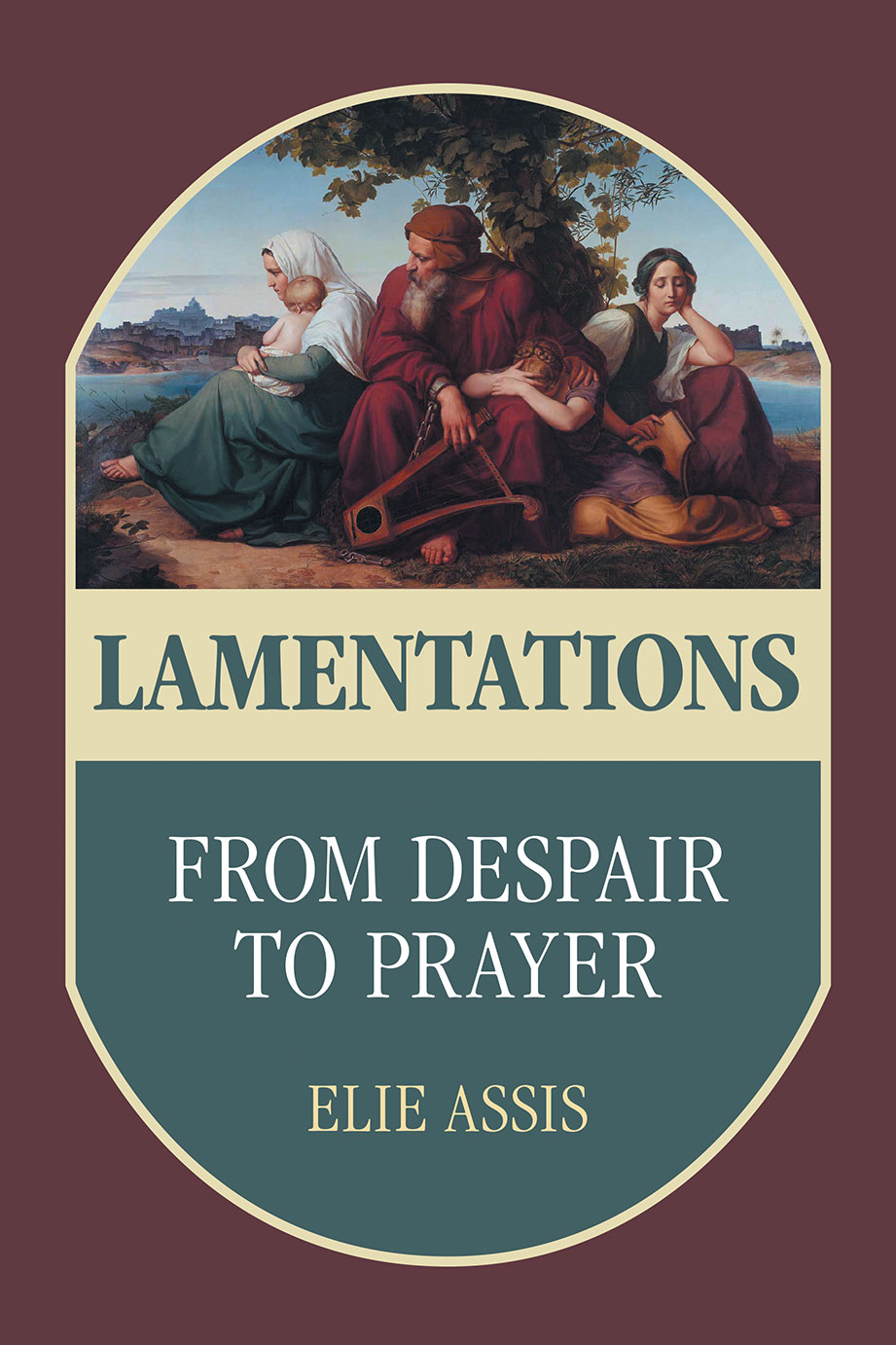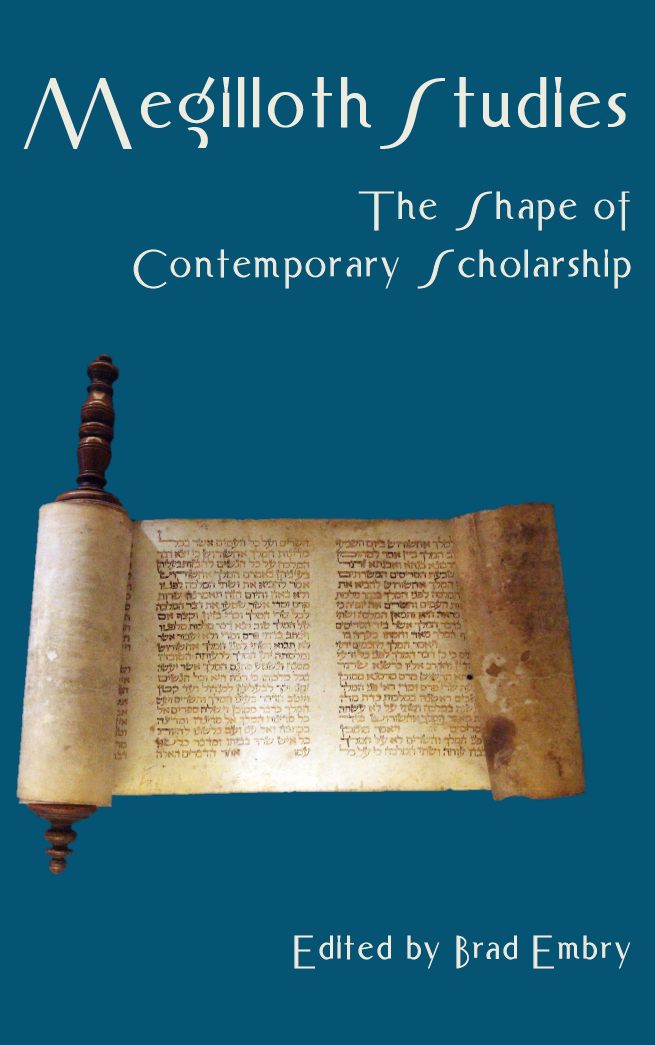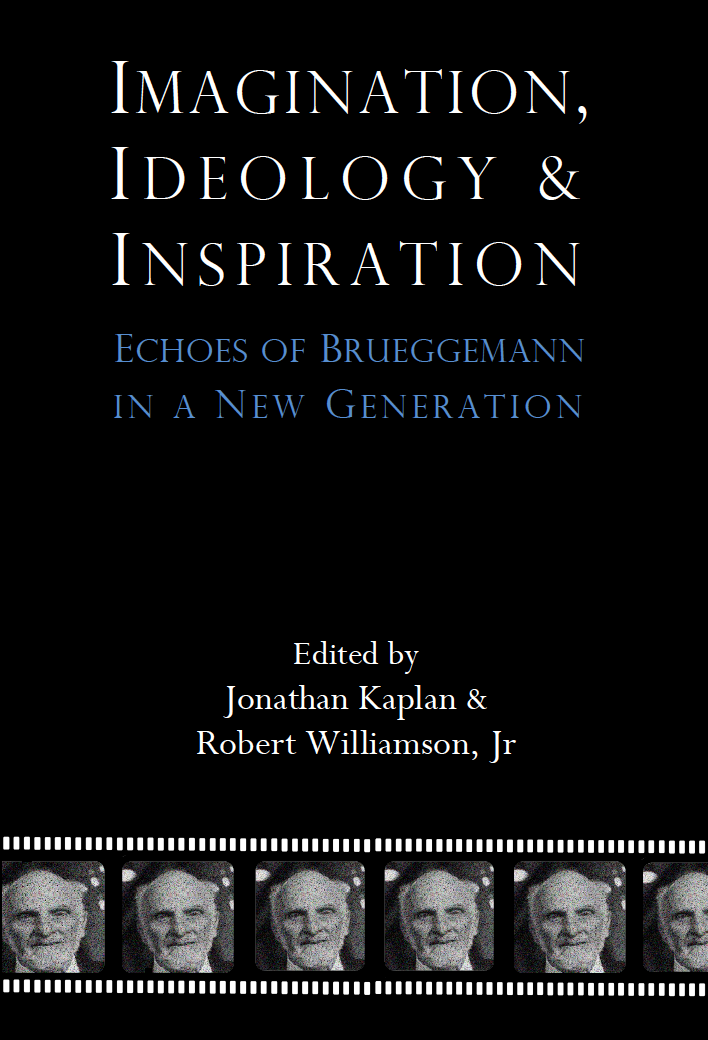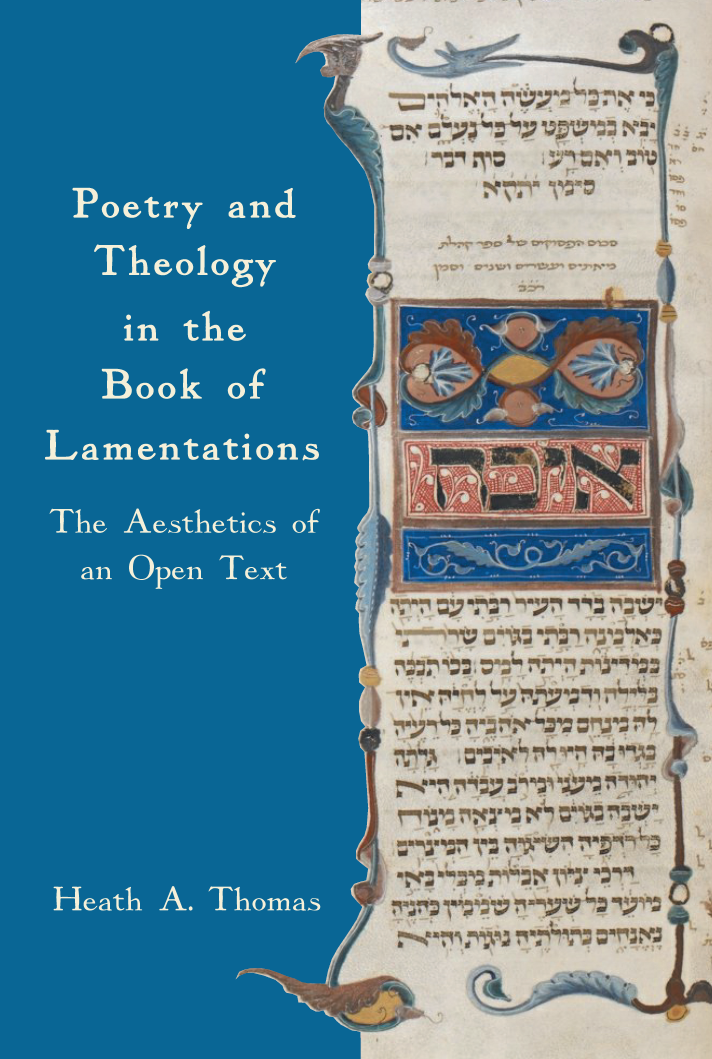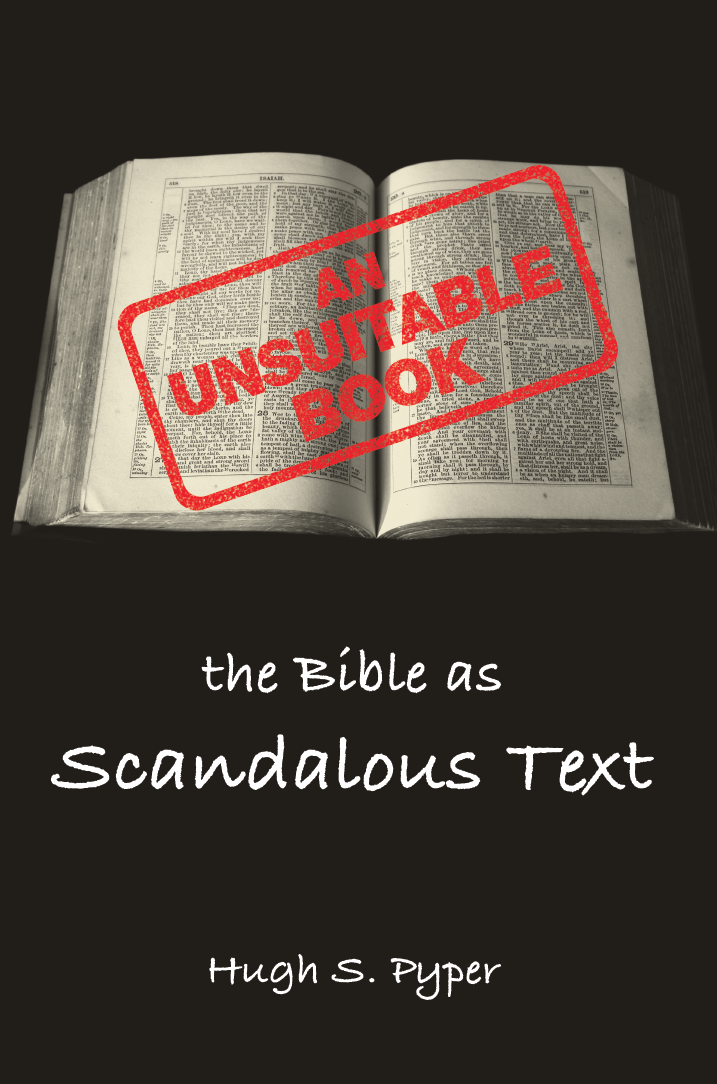The Daughter’s Resistance: Lamentations and Theodicy
Published: Nov 2025
£70.00
Susannah M Larry offers a feminist “history of consequences” of Lamentations, and via a trauma lens, surfaces the rich theodicy of the text. The Book of Lamentations has often become a conversation partner for communities in crisis, and yet, its somber poetry has most often explained the suffering experienced by way of a causal connection between sin and suffering. For many sufferers, especially trauma survivors, this perceived message of Lamentations seems, at best, unhelpful, and, at worst, retraumatizing. Familiar Jewish and Christian readings of Lamentations draw a foregone conclusion: that God has justly commissioned the Babylonian invaders to destroy Jerusalem.
The potential of harm from these interpretations of Lamentations’ can fall especially hard on those who have experienced sexual violence, which figures significantly in the attack against the Judeans in Lamentations. In contexts where rape culture dominates, which already blames the victim for their trauma, biblical interpretations like the prevailing one of Lamentations entrenches unfair stereotypes about victims’ responsibility, while exonerating offenders. And yet, a closer reading of Lamentations reveals a much more nuanced perspective on human suffering. Contrary to popular belief, Lamentations includes as much, if not more, protest of unjust suffering than pronouncement of suffering justified from sin.
Larry seeks to both analyze Lamentations 1–2’s theodicy and the reasons for victim-blaming interpretations in the modern period. The words of the female personification of Jerusalem—Daughter Zion—channel this theodicy especially, and yet the patriarchal exclusion of her voice’s textured response to suffering is lost. The Daughter’s Resistance shows how Daughter Zion resists simplicity theodicy. Through re-reading Lamentations 1-2 through the Mesopotamian forerunners to Lamentations and analyzing its Jewish and Christian receptions, this book suggests that Lamentations offers more resources to survivors than recently thought.
The Daughter’s Resistance: Lamentations and Theodicy
£70.00
Susannah M Larry offers a feminist “history of consequences” of Lamentations, and via a trauma lens, surfaces the rich theodicy of the text. The Book of Lamentations has often become a conversation partner for communities in crisis, and yet, its somber poetry has most often explained the suffering experienced by way of a causal connection between sin and suffering. For many sufferers, especially trauma survivors, this perceived message of Lamentations seems, at best, unhelpful, and, at worst, retraumatizing. Familiar Jewish and Christian readings of Lamentations draw a foregone conclusion: that God has justly commissioned the Babylonian invaders to destroy Jerusalem.
The potential of harm from these interpretations of Lamentations’ can fall especially hard on those who have experienced sexual violence, which figures significantly in the attack against the Judeans in Lamentations. In contexts where rape culture dominates, which already blames the victim for their trauma, biblical interpretations like the prevailing one of Lamentations entrenches unfair stereotypes about victims’ responsibility, while exonerating offenders. And yet, a closer reading of Lamentations reveals a much more nuanced perspective on human suffering. Contrary to popular belief, Lamentations includes as much, if not more, protest of unjust suffering than pronouncement of suffering justified from sin.
Larry seeks to both analyze Lamentations 1–2’s theodicy and the reasons for victim-blaming interpretations in the modern period. The words of the female personification of Jerusalem—Daughter Zion—channel this theodicy especially, and yet the patriarchal exclusion of her voice’s textured response to suffering is lost. The Daughter’s Resistance shows how Daughter Zion resists simplicity theodicy. Through re-reading Lamentations 1-2 through the Mesopotamian forerunners to Lamentations and analyzing its Jewish and Christian receptions, this book suggests that Lamentations offers more resources to survivors than recently thought.
Lamentations: From Despair to Prayer
Published: May 2022
£65.00
The destruction of Jerusalem and its temple in the sixth century bce brought its inhabitants pain, a feeling of abandonment by God, and the loss of self-identity—and engendered the six poems of the book of Lamentations. Previous studies of the book have sought for its theological centre, or have read the book solely as an expression of grief, but in this innovative interpretation Elie Assis claims that its main aim is to impart hope to its exiled readers. The intention of Lamentations is to transport the mourners from despair to prayer, and to offer its assurance that the destruction must only be temporary because God has not severed his covenant with the people. The people's wish to feel themselves desired by God can be fulfilled, and the divine commitment is forever binding. Through his sensitive literary analysis Assis lays bare a progression of thought within each poem and as well from poem to poem; it is a movement, theological and emotional, from despair in the first poem to prayer and hope in the last.
Lamentations: From Despair to Prayer
£65.00
The destruction of Jerusalem and its temple in the sixth century bce brought its inhabitants pain, a feeling of abandonment by God, and the loss of self-identity—and engendered the six poems of the book of Lamentations. Previous studies of the book have sought for its theological centre, or have read the book solely as an expression of grief, but in this innovative interpretation Elie Assis claims that its main aim is to impart hope to its exiled readers. The intention of Lamentations is to transport the mourners from despair to prayer, and to offer its assurance that the destruction must only be temporary because God has not severed his covenant with the people. The people's wish to feel themselves desired by God can be fulfilled, and the divine commitment is forever binding. Through his sensitive literary analysis Assis lays bare a progression of thought within each poem and as well from poem to poem; it is a movement, theological and emotional, from despair in the first poem to prayer and hope in the last.
Megilloth Studies: The Shape of Contemporary Scholarship
Published: Feb 2016
£60.00
This volume brings together two years of papers read to the Megilloth Consultation Group at the Annual Meetings of the Society of Biblical Literature; it represents some of the most recent work being done by a group of international scholars on the collection of Hebrew Bible books known as the Megilloth.
Although the individual books of the Megilloth have received ample academic attention in contemporary scholarship, relatively little has been done to situate them under this broader rubric. To this end, the present volume addresses a range of issues associated with studying the five scrolls, such as the internal relationship between the books themselves, intertextual connections between the five scrolls and other portions of the Hebrew Bible, gender and ethnic concerns in the five scrolls, and the theological commitments and contours of the collection. Several of the papers and the volume itself also intentionally wrestle with the viability of the category 'Megilloth' as a meaningful term in academic studies of these writings.
In addition to papers on the Megilloth in general (Galvin, Stone, Fullerton Strollo), there are studies on Esther (Davis, Greenspoon, Avnery, Peters, three of them in relation to Ruth), Lamentations (Gruber and Yona, Flanders) and Qoheleth (Weeks).
Megilloth Studies: The Shape of Contemporary Scholarship
£60.00
This volume brings together two years of papers read to the Megilloth Consultation Group at the Annual Meetings of the Society of Biblical Literature; it represents some of the most recent work being done by a group of international scholars on the collection of Hebrew Bible books known as the Megilloth.
Although the individual books of the Megilloth have received ample academic attention in contemporary scholarship, relatively little has been done to situate them under this broader rubric. To this end, the present volume addresses a range of issues associated with studying the five scrolls, such as the internal relationship between the books themselves, intertextual connections between the five scrolls and other portions of the Hebrew Bible, gender and ethnic concerns in the five scrolls, and the theological commitments and contours of the collection. Several of the papers and the volume itself also intentionally wrestle with the viability of the category 'Megilloth' as a meaningful term in academic studies of these writings.
In addition to papers on the Megilloth in general (Galvin, Stone, Fullerton Strollo), there are studies on Esther (Davis, Greenspoon, Avnery, Peters, three of them in relation to Ruth), Lamentations (Gruber and Yona, Flanders) and Qoheleth (Weeks).
Imagination, Ideology and Inspiration: Echoes of Brueggemann in a New Generation
Published: Aug 2015
£60.00
By any account, Walter Brueggemann stands as one of the foremost interpreters of the Hebrew Bible of the past half-century. Yet the question remains of what his influence will be on the next generation of biblical scholars, who have learned from Brueggemann and taken his work in new and often surprising directions. This volume engages that question by presenting the work of fourteen of Brueggemann's former students at Columbia Theological Seminary (Decatur, Georgia) who are now biblical scholars in their own right, asking how his influence has been received and transformed by them.
Essays in this volume present imaginative new readings of well-known texts, from the crisis of God in Genesis 22 to God's birthing body in Job 38. They engage the ideology of the text, discovering the voice of a female prophet in the book of Isaiah, a Job in drag, and a feminist Qohelet. They grapple with the implications of the text for contemporary life, from reading Lamentations after Hiroshima to considering how the production of Bibles is an act of ideological control. While clearly resonating with Brueggemann's work, these essays also take his influence in new directions, from deeper engagement with rabbinic interpretation to the incorporation of new theoretical perspectives from Lacan to Žižek to Deleuze and Guattari.
An introduction by Brent Strawn considers Brueggemann's influence in the field more generally, while a response from Carolyn Sharp offers soundings for a new generation of scholars.
Imagination, Ideology and Inspiration: Echoes of Brueggemann in a New Generation
£60.00
By any account, Walter Brueggemann stands as one of the foremost interpreters of the Hebrew Bible of the past half-century. Yet the question remains of what his influence will be on the next generation of biblical scholars, who have learned from Brueggemann and taken his work in new and often surprising directions. This volume engages that question by presenting the work of fourteen of Brueggemann's former students at Columbia Theological Seminary (Decatur, Georgia) who are now biblical scholars in their own right, asking how his influence has been received and transformed by them.
Essays in this volume present imaginative new readings of well-known texts, from the crisis of God in Genesis 22 to God's birthing body in Job 38. They engage the ideology of the text, discovering the voice of a female prophet in the book of Isaiah, a Job in drag, and a feminist Qohelet. They grapple with the implications of the text for contemporary life, from reading Lamentations after Hiroshima to considering how the production of Bibles is an act of ideological control. While clearly resonating with Brueggemann's work, these essays also take his influence in new directions, from deeper engagement with rabbinic interpretation to the incorporation of new theoretical perspectives from Lacan to Žižek to Deleuze and Guattari.
An introduction by Brent Strawn considers Brueggemann's influence in the field more generally, while a response from Carolyn Sharp offers soundings for a new generation of scholars.
Chorus in the Dark: The Voices of the Book of Lamentations
Published: Oct 2013
£60.00
Chorus in the Dark invites attention to the treaty negotiated by the voices of Lamentations. The issues of God's justice and human rights are at the centre of a forceful discussion embodied in the five poems of Lamentations. Difficult questions are subtly raised: How can God's justice be recognized and honoured in the midst of suffering? How can the human right to protest against mistreatment be respected? How can loss, grief, and shame be overcome? What future is there for the victims? How can these sensitive issues be negotiated without loss?
Zion is the first major speaker in Lamentations. Zion projects the voice of a woman crying by the grave. Her pain is intense, her loss is vast, her anger is uncontrollable. Zion is unable to see any future. God is indeed just in destroying her, but her surviving children do not deserve her fate.
The other major speaker is the man of Lamentations 3. He too speaks of the pain, grief, anger, and desire for vengeance of a victim bent under the yoke of affliction. Yet, like a Davidic king, he dares to claim covenant promises and hope that darkness will eventually turn to light.
Through both harmony and discord, and with a profound ambivalence toward the future, the separate voices of Lamentations resonate in a timbre that transcends the sum of its parts. The five poems, while having unique value individually, are meant to be read together as a living documentation of a moment of suspension, a great turning point in the history of Israel.
Chorus in the Dark: The Voices of the Book of Lamentations
£60.00
Chorus in the Dark invites attention to the treaty negotiated by the voices of Lamentations. The issues of God's justice and human rights are at the centre of a forceful discussion embodied in the five poems of Lamentations. Difficult questions are subtly raised: How can God's justice be recognized and honoured in the midst of suffering? How can the human right to protest against mistreatment be respected? How can loss, grief, and shame be overcome? What future is there for the victims? How can these sensitive issues be negotiated without loss?
Zion is the first major speaker in Lamentations. Zion projects the voice of a woman crying by the grave. Her pain is intense, her loss is vast, her anger is uncontrollable. Zion is unable to see any future. God is indeed just in destroying her, but her surviving children do not deserve her fate.
The other major speaker is the man of Lamentations 3. He too speaks of the pain, grief, anger, and desire for vengeance of a victim bent under the yoke of affliction. Yet, like a Davidic king, he dares to claim covenant promises and hope that darkness will eventually turn to light.
Through both harmony and discord, and with a profound ambivalence toward the future, the separate voices of Lamentations resonate in a timbre that transcends the sum of its parts. The five poems, while having unique value individually, are meant to be read together as a living documentation of a moment of suspension, a great turning point in the history of Israel.
Poetry and Theology in the Book of Lamentations: The Aesthetics of an Open Text
Published: Mar 2013
£60.00
The book of Lamentations is a challenge to its readers. Its ambiguous theology, strident protestations against its deity, and haunting imagery confound interpreters. This monograph engages the enigma of Lamentations by assessing its theology. It does so, however, neither by tracing a single theological perspective through the book nor by reconstructing the history of the composition of the book. Rather, Heath Thomas assesses the poetry of Lamentations by offering a close analysis of each poem in the book. He reconsiders the acrostic as the foundational structure for the poetry, reads the book as an intentionally composed whole, and assesses the pervasive use of repetition, metaphor, and allusion.
For the first time in the field, the analysis here is grounded on the insights of the Italian semiotician Umberto Eco. Drawing upon Eco's distinction between 'open' and 'closed' textualities, Thomas argues that Lamentations represents a distinctively 'open' text, one that presents its reader with a myriad of surprising avenues to interpret the poetry. This distinctive approach avoids a polarization in the portrait of God in Lamentations, arguing that its poetry neither justifies God outright nor does it exonerate God's people in the exilic age. Rather, it enables these theological visions to interrelate with each another, inviting the reader to make sense of the interaction.
The ambiguous theological vision of Lamentations, then, is not a problem that the reader is intended to overcome but an integral feature in the construction of meaning. This original monograph offers a new perspective on how the poetry informs our appreciation of theological thought in the exilic age.
Poetry and Theology in the Book of Lamentations: The Aesthetics of an Open Text
£60.00
The book of Lamentations is a challenge to its readers. Its ambiguous theology, strident protestations against its deity, and haunting imagery confound interpreters. This monograph engages the enigma of Lamentations by assessing its theology. It does so, however, neither by tracing a single theological perspective through the book nor by reconstructing the history of the composition of the book. Rather, Heath Thomas assesses the poetry of Lamentations by offering a close analysis of each poem in the book. He reconsiders the acrostic as the foundational structure for the poetry, reads the book as an intentionally composed whole, and assesses the pervasive use of repetition, metaphor, and allusion.
For the first time in the field, the analysis here is grounded on the insights of the Italian semiotician Umberto Eco. Drawing upon Eco's distinction between 'open' and 'closed' textualities, Thomas argues that Lamentations represents a distinctively 'open' text, one that presents its reader with a myriad of surprising avenues to interpret the poetry. This distinctive approach avoids a polarization in the portrait of God in Lamentations, arguing that its poetry neither justifies God outright nor does it exonerate God's people in the exilic age. Rather, it enables these theological visions to interrelate with each another, inviting the reader to make sense of the interaction.
The ambiguous theological vision of Lamentations, then, is not a problem that the reader is intended to overcome but an integral feature in the construction of meaning. This original monograph offers a new perspective on how the poetry informs our appreciation of theological thought in the exilic age.
Protest Against God: The Eclipse of a Biblical Tradition
Published: Jan 2007
Price range: £25.00 through £80.00
The Hebrew Bible contains many examples of protest or complaint against God. There are classic cases in the psalms of individual lament, but we find the same attitude in community complaint psalms, in the prophetic challenges to God, and in the Book of Job.
And yet, after the exile, the complaint tradition was largely suppressed or marginalized. In this imaginative book, Morrow asks the unheard of question, Why? A shift in the religious imagination of early Judaism had taken place, he argues, spearheaded by the psychology of trauma and by international politics. A magnification of divine transcendence downgraded the intercessory role of the prophet, controlled the raw pain of exile (Lamentations, Second Isaiah), and led to intransigent refusal of the logic of lament (the friends and Yahweh in Job). The theology of complaint was eventually overshadowed by the piety of penitence and praise (the Dead Sea Scrolls).
Modern readers of the Hebrew Bible are not obliged to assent to the loss of lament, nevertheless. Ours is an age when the potency of the biblical complaints against God is being newly appropriated. Although the transcendental imagination of Western culture itself is moving into eclipse, a heightened individual consciousness has emerged. There may still be life, therefore, in the ancient prayer pattern of arguing with God, which assumes that worshippers have rights with God as well as duties, that the Creator has obligations to the creation as well as prerogatives.
This stylish intellectual history will be welcomed for its scope, its panache and its theological engagement. Awarded the 2007 R.B.Y. Scott Book Award for an outstanding book in the areas of Hebrew Bible and/or the Ancient Near East written by a member of the Canadian Society of Biblical Studies.
Protest Against God: The Eclipse of a Biblical Tradition
Price range: £25.00 through £80.00
The Hebrew Bible contains many examples of protest or complaint against God. There are classic cases in the psalms of individual lament, but we find the same attitude in community complaint psalms, in the prophetic challenges to God, and in the Book of Job.
And yet, after the exile, the complaint tradition was largely suppressed or marginalized. In this imaginative book, Morrow asks the unheard of question, Why? A shift in the religious imagination of early Judaism had taken place, he argues, spearheaded by the psychology of trauma and by international politics. A magnification of divine transcendence downgraded the intercessory role of the prophet, controlled the raw pain of exile (Lamentations, Second Isaiah), and led to intransigent refusal of the logic of lament (the friends and Yahweh in Job). The theology of complaint was eventually overshadowed by the piety of penitence and praise (the Dead Sea Scrolls).
Modern readers of the Hebrew Bible are not obliged to assent to the loss of lament, nevertheless. Ours is an age when the potency of the biblical complaints against God is being newly appropriated. Although the transcendental imagination of Western culture itself is moving into eclipse, a heightened individual consciousness has emerged. There may still be life, therefore, in the ancient prayer pattern of arguing with God, which assumes that worshippers have rights with God as well as duties, that the Creator has obligations to the creation as well as prerogatives.
This stylish intellectual history will be welcomed for its scope, its panache and its theological engagement. Awarded the 2007 R.B.Y. Scott Book Award for an outstanding book in the areas of Hebrew Bible and/or the Ancient Near East written by a member of the Canadian Society of Biblical Studies.
An Unsuitable Book: The Bible as Scandalous Text
Published: Nov 2005
£50.00
The real 'scandal' of the Bible, suggests Hugh Pyper, lies not in any salaciousness it may contain but in its deep impropriety as a venerable book, and the 'unsuitability' of its reality to the expectations of its readers.
This collection of essays, published and previously unpublished, will delight readers with its wit and profundity. Among them, 'The Selfish Text: Memetics and the Bible' deploys Richard Dawkins's notion of memes to advance the half-teasing, half-serious thesis that western culture is the Bible's way of making more Bibles, 'The Bible in Bloom' examines the usefulness or otherwise of Bloom's concept of the 'anxiety of influence' in biblical studies, and 'The Bible as Wolf: Tracking a Carrollian Metaphor in Biblical Studies', a tribute to Robert Carroll, the author's mentor, uncovers the polyvalence of the wolf metaphor in biblical and literary traditions and calls for the recovery of the 'wild' text.
Other papers are on women and silence (with a nod to Isak Dinesen and to Freud), on the violence in Lamentations as a deflection of anger from God and so a survival strategy for the community, and on modern 'gospels of Judas' which symptomize resentment against the canon.
An Unsuitable Book: The Bible as Scandalous Text
£50.00
The real 'scandal' of the Bible, suggests Hugh Pyper, lies not in any salaciousness it may contain but in its deep impropriety as a venerable book, and the 'unsuitability' of its reality to the expectations of its readers.
This collection of essays, published and previously unpublished, will delight readers with its wit and profundity. Among them, 'The Selfish Text: Memetics and the Bible' deploys Richard Dawkins's notion of memes to advance the half-teasing, half-serious thesis that western culture is the Bible's way of making more Bibles, 'The Bible in Bloom' examines the usefulness or otherwise of Bloom's concept of the 'anxiety of influence' in biblical studies, and 'The Bible as Wolf: Tracking a Carrollian Metaphor in Biblical Studies', a tribute to Robert Carroll, the author's mentor, uncovers the polyvalence of the wolf metaphor in biblical and literary traditions and calls for the recovery of the 'wild' text.
Other papers are on women and silence (with a nod to Isak Dinesen and to Freud), on the violence in Lamentations as a deflection of anger from God and so a survival strategy for the community, and on modern 'gospels of Judas' which symptomize resentment against the canon.

